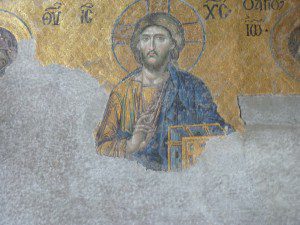Judas did the great evil for a petty payoff.
Every filmmaker and every novelist try to make Judas Iscariot more complicated than he appears in the Gospel. This student of Jesus traveled with the greatest man of history and sold him out for thirty pieces of silver. That is not very much money for your soul, but Judas made the deal and damned himself to history.
Yet it a sign of the truth of the historical records we have that this is the motive. Judas had long been stealing from the collection. Like many a Christian leader today with their big salaries, jets, and indulgent life styles, Judas probably told himself he had earned it. He had left everything to follow Jesus and was drifting around Palestine with the Messiah. He also was the treasurer and surely this job entitled him to a bit of pay.
When a woman knelt before Jesus and enacted a drama of worship . . . giving all she had to the task . . . Judas became the first of many grifters to hide behind the poor. “Why waste this money on art? We could sell the staging and give the money to the poor!” Of course, the poor never see the money and also lose the public art that nourishes the mind and the soul.
Judas got this money and sold out the Lord. He pointed other corrupt and powerful men to where Jesus was praying for us all. Judas came and pointed out his master with the intimate Eastern greeting of a trusted friend: a kiss. Jesus was arrested and would never breath free air again until He conquered death. A sinless life was betrayed for half a year’s wages.
 Like many grifters, however, Judas did not think out the results of his betrayal. Many a grifter thinks of his graft as a victimless crime: he robs from the rich to give to the poor, himself. The Temple would not miss the money. Jesus would be given a trial and be able to vindicate himself before the leaders of Israel. Since Jesus was the Son of God being arrested would force His hand. The man who could command angels would never stay in jail and be killed. Judas was forcing the Messiah’s hand . . . Jesus was so pure and so holy that He was not forceful enough.
Like many grifters, however, Judas did not think out the results of his betrayal. Many a grifter thinks of his graft as a victimless crime: he robs from the rich to give to the poor, himself. The Temple would not miss the money. Jesus would be given a trial and be able to vindicate himself before the leaders of Israel. Since Jesus was the Son of God being arrested would force His hand. The man who could command angels would never stay in jail and be killed. Judas was forcing the Messiah’s hand . . . Jesus was so pure and so holy that He was not forceful enough.
This was all nonsense. Judas knew better in his heart, but it is human to engage in justification by rationalization. He got what he wanted: loot. When Judas saw the results of his greed, he was sorry and tried to fix the problem. The small time grifter went back to the Temple authorities and tried to give the money back and get Jesus freed. Petty evil met powerful evil and petty evil was humiliated.
Judas got it at last: “I have sinned by betraying innocent blood. The tyrants laughed at him. “What is that to us?” they said and Judas learned that sorry does not fix everything. A man can go so far and sell out his friends so badly that repentance is too late. The small crime has led to bigger crimes and the little deal has become a big deal. Judas was damned and he knew it.
And yet though Judas had behaved infamously, there was still a chance to repent. He ought to have known Jesus. The sinless man who would forgive his murderers from the Cross would have forgiven Judas, but Judas would have had to face his friends. He would have had to lose status and go to the back of the class. Judas could not stand his crime and so committed another: he hanged himself.
He was not “out of his mind,” but seeing his normal mind for the first time: Judas could not stand the man revealed to him in the reflections from the 30 pieces of silver. Judas had stolen, justified, lied, dodged, and betrayed but now the game was over. There was nobody left to betray but Judas. This was murder, not the act of a man out of his senses with depression. He carefully purchased his place of death and made sure that he would never have to admit his pettiness, his graft, his corruption.
Of course, the problem is that death is no escape from self. Instead, Judas fixed his character at the moment of death and imploded into a damned soul. He loved money more than the man and so lost both.
We see the great evil Judas did and hate that it began with such a petty sin. We know that we would not burn down the Reichstag or set up a Gulag. We do not have the power. But we might betray a friend (surely it will not hurt the friend that much!) for money or position or power. It is true that most of us do not have it within ourselves to be Hitler, Stalin, or Mao. We do have the capacity to be Judas.
Lord Jesus Christ, son of God, who forgave from the Cross, have mercy on me a sinner.











